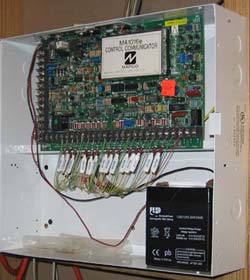

Beginning the in the latter part of the 20th century electronic home security became the popular thing to do. And while it does provide a large measure of sophisticated technology, at a reasonable price to protect your home it doesn't work magically and it doesn't replace common sense. If you fail to lock your doors and windows, or arm the system chances are it won't do you much good. To avoid having an intrusion and loss, you must continue with the practical common sense methods along with the electronic protection. In is important to keep in mind that the ultimate goal of all security measures in to prevent intrusion and scare away the intruder when an attempt is made.
And while it does provide a large measure of sophisticated technology, at a reasonable price to protect your home it doesn't work magically and it doesn't replace common sense. If you fail to lock your doors and windows, or arm the system chances are it won't do you much good. To avoid having an intrusion and loss, you must continue with the practical common sense methods along with the electronic protection. In is important to keep in mind that the ultimate goal of all security measures in to prevent intrusion and scare away the intruder when an attempt is made.
There are many kinds of electronic home security systems available today. These include the following:
- Door/window magnetic, audio, and integrity sensors
- Heat/motion/sound detectors
- Alarm bells
- Call systems that alert police or a security company
- Video/audio surveillance
Whole House Systems
Whole house electronic security systems have been around for decades. Typically a company will come in and install sensors on all your exterior doors and windows. Usually one or two (or perhaps more) motion/heat/sound detectors will be placed at critical junctures in your house. Often they are mounted high up where they are less obvious and aim at entrance ways or large open areas. These will be linked either by wires or by wireless means to a central command post. This is essentially a small computer that receives input.
The system typically will be inactive until armed. You can arm it by keying in a code (also the way to disarm it) or sometimes by simply setting up an electronic clock that tells it when to go on or off.
If it detects an intrusion into your home, it can do a variety of things, depending on the sophistication of the system and what you've programmed in. These include:
- Setting off a loud klaxon to scare aware intruders and alert neighbors of a problem.
- Issuing a loud warning inside the home that, hopefully, will scare aware intruders.
- Silently making a phone call to a security company that can then either send out its own patrol car or alert police.
- Calling the local police department and letting them know that they need to investigate.
- Calling you on your cell phone and alerting you to the problem.
Select your security company with great care!
Be very selective when choosing a security company especially if they have contacted you first. Be extra careful if it was a door to door solicitation. Usually when a security company contacts you, you'll be asked to fill out information so that they can come to your home and give you a free inspection an evaluation. Be very careful about giving information to and letting people or companies you don't know into your house because they might just be crooks casing the place for a break-in. Also, be careful of buying from sales people who might be making a hefty commission by getting you to buy the biggest, most expensive system.
The security companies that install these whole home security systems usually swear by their effectiveness. I know a good many people who have own them and own one myself, so I feel qualified to mention that there are advantages and disadvantages to relying on one for complete protection as they also come with some potential problems. We will continue with that portion of the discussion in Home Security Systems - Advantages and Disadvantages.